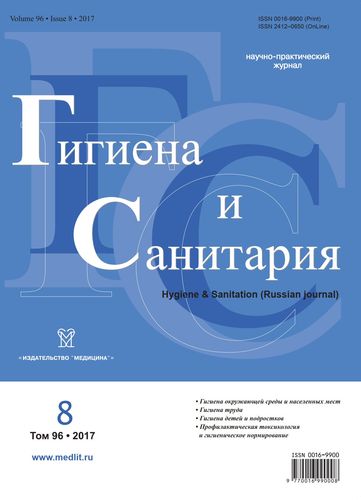Immunological indices of the human in conditions of the application of individual means of protection of respiratory organs
- Authors: Byalovskiy Y.Y.1, Bulatetskiy S.V.1, Kiryushin V.A.1, Prokhorov N.I.2
-
Affiliations:
- Ryazan State Medical University
- I.M. Sechenov First Moscow State Medical University
- Issue: Vol 96, No 8 (2017)
- Pages: 717-720
- Section: ENVIRONMENTAL HYGIENE
- Published: 21.10.2020
- URL: https://rjsocmed.com/0016-9900/article/view/640654
- DOI: https://doi.org/10.47470/0016-9900-2017-96-8-717-720
- ID: 640654
Cite item
Full Text
Abstract
The purpose of the work was to study reactions of the immune system with the use of additional respiratory resistance arising from the use of personal respiratory protection. The inspiratory resistance to respiration of 20, 40 and 60% Pmmax was used. The study involved 26 male and female cases at the average age of 21, 22, 23 years. Based on the results of the study the short-term (3 minutes) effect of inspiratory resistive loads was shown to have a pronounced effect on the population and subpopulation composition of blood lymphocytes, practically without changing the level of secreted immunoglobulins. Different values of additional resistance to respiration were noted to statistically significantly change the level of biogenic amines: the concentration of epinephrine and norepinephrine with elevating values of resistive loads progressively increased; the serotonin concentration shows the opposite dynamics. The work demonstrates the additional respiratory resistance of 20% Pmmax fail to change the immunological status of the subjects. The resistive respiratory load of 40% Pmmax caused immunosuppressive changes in the population composition of lymphocytes and indices of nonspecific immunological resistance. An additional respiratory resistance of 60% Pmmax induced an immunostimulatory effect in the change in the population composition of lymphocytes and in indices of nonspecific immunological resistance. Based on the data obtained, a suggestion has been made that in designing individual respiratory protection devices it is advisable to limit the value of additional inspiratory resistance to respiration of 20% Pmmax.
About the authors
Yury Yu. Byalovskiy
Ryazan State Medical University
Author for correspondence.
Email: b_uu@mail.ru
ORCID iD: 0000-0002-6769-8277
MD, PhD, DSci., Head of the Department of Pathophysiology of the Ryazan State Medical University, Ryazan, 390026, Russian Federation.
e-mail: b_uu@mail.ru
Russian FederationS. V. Bulatetskiy
Ryazan State Medical University
Email: noemail@neicon.ru
ORCID iD: 0000-0002-6023-7523
Russian Federation
V. A. Kiryushin
Ryazan State Medical University
Email: noemail@neicon.ru
Russian Federation
N. I. Prokhorov
I.M. Sechenov First Moscow State Medical University
Email: noemail@neicon.ru
Russian Federation
References
- Kosarev V.V., Babanov S.A. Occupational Diseases of the Respiratory System [Professional’nye zabolevaniya organov dykhaniya]. St. Petersburg: Infra-M; 2013. (in Russian)
- Kaminsky S.L. Fundamentals of Rational Respiratory Protection in the Workplace [Osnovy ratsional’noy zashchity organov dykhaniya na proizvodstve]. Moscow: Prospekt Nauki; 2007. (in Russian)
- Russell J. The Gas Mask. Moscow: Kniga po Trebovaniyu; 2012. (in Russian)
- Technical and special means of ensuring civil defense and protection from emergencies. St. Petersburg: Institut riska i bezopasnosti; 2007.
- Byalovskiy Yu.Y. Reciprocal reactions of the body to different values of increased resistance to breathing. Rossiyskiy mediko-biologicheskiy vestnik imeni akademika I.P. Pavlova. 2016; (1): 19–25. (in Russian)
- Byalovskiy Yu.Yu., Bulatetskiy S.V. The reaction of the body’s systems to increased resistance to breathing in groups with different levels of adaptive capacity. Tsentral’nyy nauchnyy vestnik. 2016; 1 (4): 7–11. (in Russian)
- Byalovskiy Yu.Yu., Abrosimov V.N. Pneumatic dispenser of external resistance to breathing. Patent RF № 2071790; 1997. (in Russian)
- Falta W., Kahn F. Clinical studies on tetany with special regard to the vegetative nervous system. Department of Clinical Medicine. 1912; 74: 108–77.
- Miyake S. Mind over cytokines: Crosstalk and regulation between the neuroendocrine and immune systems. Clin. Exp. Neuroimmunol. 2012; (3): 1–15.
- Zemskov A.M., Zemskov V.M., Karaulov A.V. Clinical Immunology [Klinicheskaya immunologiya]. Moscow: GEOTAR-Media; 2008. (in Russian)
- Dai R., Ahmed S.A. MicroRNA, a new paradigm for understanding immunoregulation, inflammation, and autoimmune diseases. Transl. Res. 2011; 157 (4): 163–79.
- Isowa T., Ohira H., Murashima S. Immune, endocrine and cardiovascular responses to controllable and uncontrollable acute stress. Biol. Psychol. 2006; 71: 202–13.
- Lavrov O.V., Pyatin V.F., Shirolapov I.V. Stress-induced features of immunological indices in people of differentiated vegetative-hormonal clusters. Meditsinskaya immunologiya. 2013; 15 (3): 283–8. (in Russian)
- Vassilakopoulos T., Zakynthinos S., Roussos C. Strenuous resistive breathing induces proinflammatory cytokines and stimulates the HPA axis in humans. Am. J. Physiol. 1999; (10): 277–82.
- McEwen B.S. Physiology and Neurobiology of Stress and Adaptation: Central Role of the Brain. Physiol. Rev. 2007; (87): 873–904.
- Besedovsky H.O., Rey A.D. Physiology of psychoneuroimmunology: a personal view. Brain. Behav. Immun. 2007; (21): 34–44.
- Selye H. Present status of the stress conceprt. Clin. Ther. 1977; (1): 3–15.
Supplementary files









